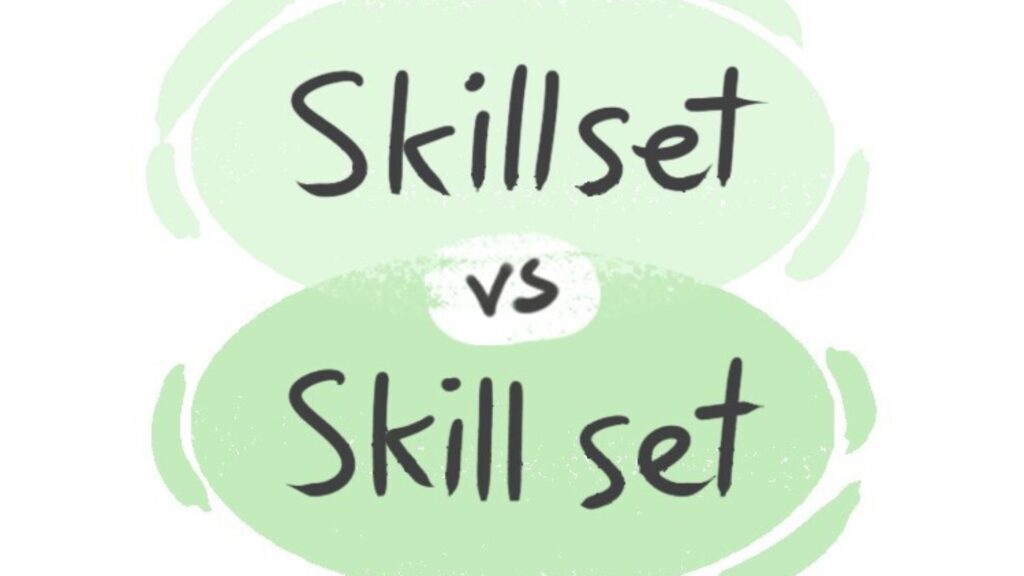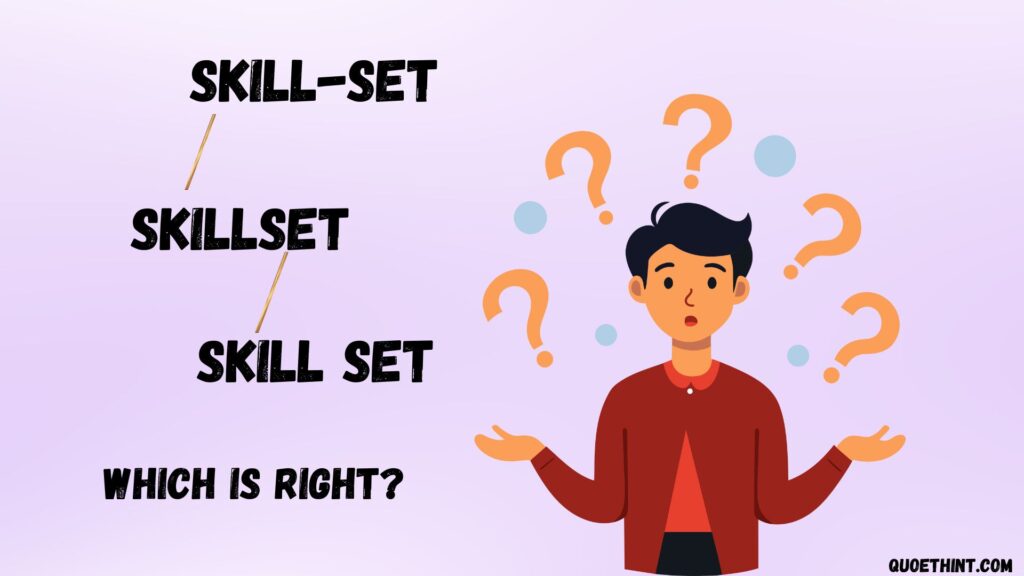Introduction — Why the Confusion Around “Skill Set”?

If you’ve ever drafted a resume, sent an email, or read a job posting, chances are you’ve stumbled on the phrase in one of its many forms: skill set, skillset, or skill-set. At first glance, they all look similar, but the way you write this term can say a lot about your attention to professional writing standards.
The problem is that usage varies. Some people prefer skillset because it feels modern, others stick with skill set since it’s grammatically precise, and a few still toss in a hyphen for skill-set, even though it’s rarely correct. So which form should you use, and does it really matter?
The short answer: it matters if you want to sound polished and professional. Let’s break it down.
“Skill Set” — The Standard Form
The most widely accepted spelling is skill set, written as two separate words. This form is recognized as an open compound noun. Style authorities like the AP Stylebook and the Chicago Manual of Style recommend this version. Dictionaries such as Merriam-Webster and the Oxford English Dictionary also list skill set as the preferred form.
Think of it as describing a collection of abilities—a “set” of “skills” bundled together.
✅ Correct usage in an email:
Subject: Candidate Review
Hi James,
After reviewing Sarah’s application, I believe her skill set in data analysis and project management makes her an excellent fit for the role.
Best,
Emma
In professional environments like resumes, cover letters, and formal writing, skill set signals clarity and respect for career advancement skills.
“Skillset” — The Modern Shortcut
Now let’s talk about skillset as one word. This form is a closed compound noun. It’s not wrong in casual writing, but it’s still considered informal in grammar circles.
Despite this, skillset has gained traction, especially in online content, social media posts, and even LinkedIn discussions. Many recruiters, hiring managers, and job seekers use it interchangeably with skill set.
✅ Correct usage in a LinkedIn post:
“Building a strong skillset in communication and leadership will open doors in any industry.”
The reality is, English often condenses over time. Just as “website” started as “web site,” it wouldn’t be surprising if skillset becomes more formally recognized in the future. For now, though, most grammar and style guides still prefer the two-word version.
“Skill-Set” — The Awkward Middle Ground
Finally, there’s skill-set, the hyphenated version. While it pops up here and there, it’s not supported by dictionaries or major style guides. It usually appears because someone assumes hyphenation looks more formal. In truth, it adds unnecessary complexity.
❌ Incorrect usage in a resume excerpt:
Skills
- Strong leadership skill-set
- Advanced Excel proficiency
The hyphen doesn’t add clarity, so it’s best to avoid it. Think of skill-set as a relic—occasionally seen, but out of step with modern professional clarity.
What the Dictionaries Say
Here’s how some major references handle the variations:
- Merriam-Webster: Lists skill set as the main entry.
- Oxford English Dictionary: Recognizes skill set, with usage examples dating back to 1976.
- Cambridge Dictionary: Recommends skill set for professional writing.
In short, dictionaries and grammar and style guides overwhelmingly support the two-word form.
Historical Usage & Trends

The phrase skill set first appeared in print in the 1970s. A 1976 example referenced an engineer’s “broad skill set.” Since then, it’s become a staple in hiring language.
Google Trends data shows an interesting shift: while skill set still dominates, skillset has grown in popularity over the last decade, especially in North American English. Meanwhile, in British English, the traditional skill set remains far more common.
This shows how regional spelling differences and public perception influence word choice.
Synonyms & Alternatives to Use
Sometimes, using skill set or skillset repeatedly can sound clunky. Mixing in synonyms makes writing smoother and more engaging. Consider:
- Competencies
- Expertise
- Qualifications
- Abilities
- Capabilities
- Strengths
- Proficiencies
For example, instead of saying, “John has a strong skill set in leadership,” you might write, “John’s competencies in leadership and team management drive results.”
This variety helps you maintain clarity in writing and avoid repetition.
Professional Writing Guidelines
When it comes to professional writing standards, consistency is key. Here’s a quick breakdown:
- Resumes & Cover Letters: Always use skill set. Employers and ATS systems scan for clarity.
- Job Postings: Stick with skill set to maintain professionalism.
- Emails: Use skill set in formal emails.
- Informal Writing & Social Media: Skillset is acceptable but optional.
- Never Use: Skill-set — it’s not recognized.
Think of it like dressing for an interview. You wouldn’t wear flip-flops to a board meeting, so don’t throw in a hyphen when the industry doesn’t back it.
Practical Scenarios & Examples
H3: Formal Email (Correct)
Subject: Role Requirements
Hi David,
The role requires a skill set in client relations, negotiation, and strategic planning. Please confirm if we should shortlist the candidate.
Regards,
Maria
H3: Resume Excerpt (Correct vs. Incorrect)
Correct:
- Developed a diverse skill set in project coordination and budget management.
Incorrect:
- Strong skill-set in project coordination and budget management.
H3: Job Posting Example
“We’re seeking candidates with a skill set that includes creativity, problem-solving, and data-driven decision-making.”
H3: LinkedIn Discussion
“Your skillset is your toolbox. Keep sharpening your tools if you want to stay competitive in today’s job market.”
Final Verdict — Which Is Right?
So, what’s the answer to the debate over “skill set,” “skillset,” or “skill-set”?
- ✅ Skill set: The correct usage of skill set in formal writing like resumes, job postings, and professional emails.
- ⚖️ Skillset: Informal but increasingly accepted in online content and social media posts.
- ❌ Skill-set: Not supported by dictionary standards or compound word rules; best avoided.
At the end of the day, the goal is consistency in communication. Use the form that matches your audience and context. If you’re writing for professional clarity, go with skill set. If you’re posting casually on LinkedIn, skillset won’t raise eyebrows.
Remember: your choice of wording can reflect your competencies, influence public perception, and even affect your job market competitiveness.
Bugti is the founder of Quoethint.com, a hub for English language tips, writing advice, and grammar guidance. With years of experience in English studies and a passion for clear communication, Bugti created this platform to make grammar and writing easy to understand for everyone.
